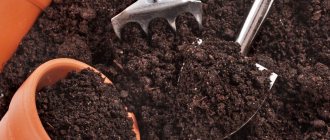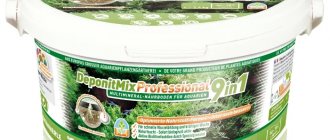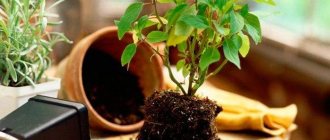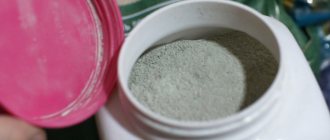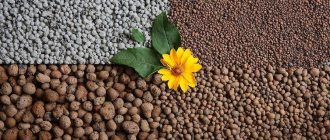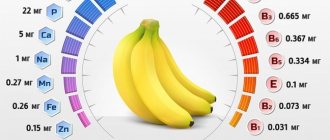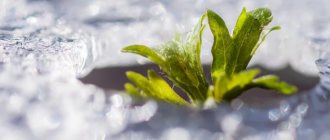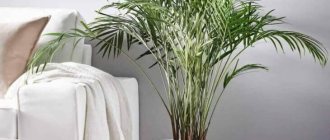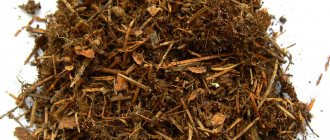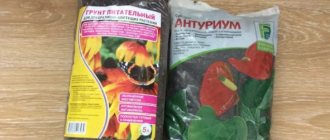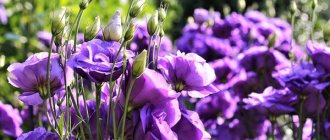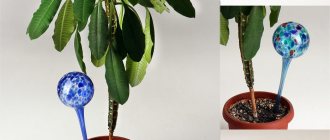How to care for a plant in a peat substrate?
The process of caring for plants in a peat substrate is somewhat different from caring for plants in ordinary soil.
Let's look at the main features that should be remembered if you have plants planted in a peat substrate. Large plants in a tub are difficult to replant, so they use partial replacement of the top layer of substrate. To do this, carefully, so as not to damage the roots, remove the upper part of the old substrate and add fresh one. If the old substrate is leached due to watering with hard water, an acidic substrate is added to the top layer. This will allow you to slightly correct (acidify) the bottom layer over time.
Most problems when growing plants in peat substrates arise from improper watering of the substrate. Water as needed, taking into account the needs of the plants, avoiding overdrying of the substrate and stagnation of water in the pan. There must be drainage holes in the bottom of the pot. Of the huge variety of indoor plants, only 1-2% like excessively high soil moisture (Scirpus cernuus, Pogonatherum, Cyper involucratus).
Some plants, such as Cyclamen and Uzumbara violet, do not like water getting on their leaves and buds. Therefore, they need to be watered from below.
For watering, you must use warm, soft, preferably rainwater. Tap water must be defended. To soften and simultaneously acidify the water, you can use high-moor peat (0.5 liters of high-moor peat or Sour substrate leave in a bucket of water for at least 24 hours, you can pass it through a layer of peat several times).
Issues of the quality of irrigation water are important due to the fact that too high a concentration of salts can lead to the death of plants from vascular fungal diseases.
Do not allow the substrate to dry out; if this happens, to re-saturate it with water, lower the pot into a vessel with water and hold until air bubbles come out.
If there is excessive moisture in a substrate rich in organic matter, fungal sciarid gnats or springtails (forktails, podars) can appear. Mostly they fly in from the street. In small numbers, these insects do not cause harm to plants, since they feed on dead plant debris, but the larvae can damage young plants and seedlings. Water the plants with an insecticide solution and keep them in drier conditions.
During growth, the plant consumes nutrients from the soil. To maintain its growth, it is necessary to constantly replenish the supply of nutrients. The best way is to fertilize with irrigation water. When choosing the appropriate fertilizer, pay attention to its quality. Fertilizing should be carried out with liquid complex chlorine-free mineral or organic fertilizers as needed. The first feeding is carried out 5-6 weeks after transplantation.
For very young and sick plants and cuttings, excess nitrogen, especially ammonia, is harmful. When preparing a fertilizer solution, take into account the permissible total concentration of salts, which, taking into account the salts present in irrigation water, should not exceed the above values.
Long-acting fertilizers, so-called, make it easier to care for plants. long-lasting fertilizers (granules, sticks). Use only sterile organic fertilizers.
Source
Soil for indoor plants
In almost every article I write about earthen substrate for indoor plants. And I’ve already received quite a few letters in the mail asking me to explain what’s what and where to get the ingredients to make the earth mixture. I try to answer these questions. But today I decided to write an article devoted entirely to soil for indoor flowers and its components.
Of course, any ready-made soil mixture can be easily purchased at any flower shop, and you can even save on the discounts received. But still, the best soil for indoor plants is to prepare it yourself. First of all, I would like to draw your attention to the fact that the reaction of the soil mixture (Ph) is very important for the normal development of a houseplant. Of course, the vast majority of indoor plants (and garden flowers too) grow well in neutral or slightly alkaline soils. But some of them need acidic or, on the contrary, alkaline soil mixtures. For example, they prefer a slightly acidic earthen substrate: begonia, pelargonium, cyclamen, fuchsia, fern, chrysanthemum. And azalea, camellia, hydrangea love acidic soils. On alkaline plants grow: cineraria, asparagus, cloves, lily. In its pure form, acidic soils include: peat, loam, clay-turf. Turf soil, which is taken from black soil, is most often slightly alkaline or neutral. And now a little more about each component of the soil mixture for indoor plants.
Peat is the basis of almost all known soil mixtures. And not a single flower primer sold in the store can do without it. Peat is distinguished between lowland and transitional peat. High peat is acidic, lowland peat is slightly acidic. Peat very well improves the quality of soil mixtures, making them light and loose. In peat soil, the root system of plants develops very well. In peat, seeds are germinated and cuttings are rooted. It is clear that you will not go into the swamp with a shovel to harvest peat. This is of no use. There is a lot of peat in stores. But when purchasing it, you MUST pay attention to its “origin”. If you plan to prepare soil for indoor plants that love “acid”, take high, for the rest - low.
Why ready-made peat soil is actually unsuitable for indoor flowers
Indoor plants, unlike garden plants, develop in a limited volume of substrate, so the selection of soil must be taken seriously. Among the ready-made compositions, soil mixtures based on high-moor peat are most often found on sale. It is used to make lightweight transport soil in which plants are delivered to the shelves of flower shops. Such peat quickly loses fertility after extraction, is not rich in minerals and has a number of other disadvantages.
Light, medium and heavy soil mixtures
The soil of indoor plants must meet specific requirements, which is why it is not advisable to plant all flowers in a “universal substrate”. Some need a looser mixture, others develop better in nutritious soil. Detailed information on each plant is on our website: find your flower using the search bar (on the side), or the “Alphabetical Directory” page (it contains not only official, but also popular names of plants).
Below, the website flowery-blog.ru gives approximate proportions of earthen mixtures of heavy, medium and light.
- Light mixture: (peat)-2\ (garden soil)-1\ (leaf or turf soil)-0.5\ (sand)-2\ (additional components) - agroperlite, vermiculite, charcoal, fine expanded clay.
Light earthen mixtures will be appropriate for desert cacti, succulents with thick leaves (echeveria, aloe, crassula, etc.). It is also advisable to plant young cuttings that have a fragile root system in light soil, increasing the saturation of the soil as they grow.
- Average mixture: (peat)-2\ (garden soil)-1.5\ (leaf or turf soil)-1\ (compost or humus)-0.5\ (sand)-1.5\ (additional components )-vermiculite, charcoal.
Medium soil mixtures are the most versatile; they are suitable for growing decorative deciduous species, desert palms, some succulents and beautiful flowering plants. If you are in doubt about what proportions will suit your plant, make a medium-density flower soil.
- Heavy mixture: (peat)-3\ (garden soil)-2\ (leaf or turf soil)-1.5\ (sand)-1\ (compost or humus)-1\ (additional components) - tree bark , pine needles, sphagnum moss, charcoal, vermicompost (instead of compost/humus).
Heavy soil mixtures are suitable for tropical species of palms, vines, ferns, azaleas, begonias, fuchsias, as well as tropical forest cacti. Typically, large tubs of plants, plants with a weighty root system, and thick roots are planted in denser soil.
✿
Poor wettability
After complete drying, the peat will under no circumstances be able to regain its original moisture and volume. This is due to the fact that when peat dries out, it changes its qualities and is no longer able to restore them in the future. Therefore, if the flower is not watered on time, next time the water will simply pass through the substrate without stopping. If this problem is not solved immediately, the flower will die. If you notice an immediate leakage of water from the drainage holes when watering, change your tactics. The earthen ball with the plant must be removed from the pot and placed in a basin of water. In the future, it is recommended to change the substrate.
Ready-made peat soil is simple and easy to use, it is cheap and easy to find even in supermarkets. But due to the natural properties of peat, it is not suitable for indoor flowers. To avoid disappointment, purchase soil mixtures in which high-moor peat is an additional rather than a dominant component. Check the recommendations for the composition of the substrate specifically for your plant. If necessary, dilute store-bought soil with additional ingredients - sand, vermiculite, humus.
Source
Considering the packaging
Having meticulously studied the inscriptions on the packages, we will see that in all soils the base is approximately the same and consists of the elements discussed above. So what is the difference between them then and which mixture should you choose? In my opinion, it is the composition, quantity and quality of fertilizers used that distinguishes one product from another.
The amount of fertilizer in the soil was not taken out of thin air by manufacturers; it is designed for 1-2 weeks of seedling development after planting the seeds. On the packaging you will find the inscription “N: P: K”, which indicates the content of the main nutrients - nitrogen, phosphorus and potassium.
The main thing to pay attention to is the amount of nitrogen. This is a case where more is not better. Seeds do not need a lot of nitrogen to start. Increased doses of fertilizers provoke rapid growth, but affect the immune system and do not guarantee high yields in the future. Small ones do not provide adequate nutrition and require earlier and richer feedings.
The ratio of macroelements in “Fasco” soils for seedlings (for example, “Krepysh” or “Malyshok”) is calculated specifically for young plants. The nutrient content will satisfy the needs of even demanding crops in this regard - cabbage, tomatoes, eggplants, pumpkins.
The packaging of Malyshok soil indicates the content of essential nutrients - ideal for nightshades.
It is important to know! It is undesirable to use universal and flower soils with a nitrogen content of 300-350 mg/l or higher for seedlings; they are only good for adult plants.
In addition to macroelements (nitrogen, phosphorus and potassium), plants also need microelements - magnesium, boron, copper, iron, zinc, etc. The microelement complex should be in chelated form, which is more easily absorbed by plants, especially young seedlings.
Seedlings better absorb microelements in chelated form
There is one more nuance. Sometimes manufacturers do not add a complex fertilizer, but a mixture of individual ingredients - superphosphate, ammonium nitrate, for example. When you put the soil in small pots, it may turn out dense in some places and empty in others. High-quality fertilizer contains the entire complex of useful substances in each particle and is evenly distributed throughout the entire volume of soil. This information can also be read on the primer package.
For example, he uses complex fertilizer “Substratdünger” produced in Europe, balanced in the content of macro- and microelements. It is designed specifically for peat substrates and soils and is completely soluble in water, which ensures uniform soil fertility.
The composition of the Malyshok soil takes into account the needs of nightshade crops for macro- and microelements and is ideal for picking tomatoes. The packaging also includes planting and care instructions for beginners.
Universal soil: what plants is it suitable for?
A beautiful, neat garden, vegetable garden and even a home flower garden is not only the pride of any owner, but also a huge amount of effort and painstaking work. As well as the correct selection of soil, fertilizers, regular and comprehensive care. In this matter, every detail matters, this is especially true in relation to the selection of soil. The final result of your efforts, the health, appearance and fertility of the plant will depend on it, along with light, water and carbon dioxide. Today we’ll talk about universal soil, what it is and when the use of such soil will benefit your plants.
Why is soil called universal?
When purchasing soil, you need to consider several characteristics:
The biggest and most common mistake in caring for plantings is the idea that a plant can take root in absolutely any soil. But in fact, it turns out that sterility, inconvenience, unknown or inappropriate composition, nutritional value, “richness” of the soil are good reasons to give preference to store-bought, ready-made products. Therefore, if you are not sure that you can handle it yourself, give preference to universal, ready-made substrates. Such soil allows you to significantly save energy and time, provides adequate and high-quality conditions for all plants, and guarantees their growth in an ideal environment for them. Of course, such mixtures are expensive. But believe me, as a rule, such costs are more than compensated for by a rich harvest, powerful flowering, and longevity of the plant.
A single, complex soil mixture is considered universal, since it is suitable for all groups and types of plants, and its composition is averaged in its characteristics and indicators. At the same time, even very fastidious and demanding crops take root well in such soil.
Separately, I would like to talk about creating a universal soil with your own hands. It is extremely difficult to create the right soil mixture for your plants yourself, so professionals do not advise taking on this task. You run the risk of not only encountering problems with soil treatment and incorrect division of proportions, but you will also be forced to spend a lot of money. Good, universal soil includes a large number of components: from peat, turf soil to sand and humus. This task is not always within the power of even very experienced and intelligent gardeners.
Coniferous land
This soil is simply necessary for violets (Saintpaulias), gloxinias (Siningias), begonias and azaleas. Some gardeners grow these indoor plants in clean coniferous soil. I also had such experiments. But as a result, I still make soil mixtures for them, although their basis is coniferous soil. It is harvested, of course, in a coniferous forest. But not every coniferous forest (or forest area) is suitable for this. For the most part, the soil under the trees has a high sand content, which in itself is not scary, but you need land. So, what is here, you need to look.
This ingredient in soil for indoor plants has nothing to do with soil, but is a very important component. Many beginning gardeners treat sand with disdain. But in vain. Red construction sand, which is the most easily accessible, is practically unsuitable for earth mixtures. It contains many harmful iron compounds. Although it is used, its use does not benefit the plant. Coarse-grained white river sand is considered the best; it can be used without any preparation. But sea sand needs to be rinsed well several times to free it from salt (but I wouldn’t recommend using it either).
Here, in brief, are all the main components of soil for indoor plants. And the last thing...
After making an earthen mixture for indoor plants, be sure to steam it. This will clear it of “living creatures” and seeds, weeds that you don’t need at all.
Pros and cons of universal primer
Universal soil has a number of significant advantages over ordinary soil. The advantages of such an admixture include:
Another important advantage is that universal primer is convenient to use; it does not require active or additional processing. Caring for plants in such soil is simple and ergonomic, and does not take much time. The universal soil stimulates well the development and active growth of the root system and restores the decorative properties of plants. With its help, you can bring weak, sickly plants back to life. But even despite the significant and significant advantages, universal soil also has its certain disadvantages. Lack of care, problems with growing crops and other shortcomings also arise in this case.
In order not to make a mistake with your purchase and thereby not spoil the plants, use the tips on choosing a universal soil.
Why is it better to buy a substrate than to prepare it yourself?
There are some geniuses who know where and how much to dig up land, where to add sand, bark or pine needles.
But to become such a professional, you need to study at the Faculty of Agriculture or have extensive experience with a number of failures. For most ordinary flower lovers, these are not methods. The only way not to destroy the flower is to buy a substrate for indoor plants. Those professionals mentioned above have nothing against such a decision. And all because there are several strong arguments in favor of buying ready-made soil:
- Substrate manufacturing teams employ specialists who calculate the balance of nutrients, minerals and other components for the flower. They accurately recreate the ideal habitat.
- Although park soil looks good, it is not what houseplants need. With such a base, you need to carry out several more operations to make a full-fledged substrate. Not a single indoor flower will feel comfortable in ordinary “wild” soil. Perhaps bulbous flowers like hyacinths, tulips, etc.
- There is a high probability that the soil in the city park is oversaturated with metals and toxins. There is no such thing in ready-made soil for flowers. The material is processed and sterilized.
- With ready-made soil for indoor plants, you don’t need to spend a lot of time. I just bought, mixed and planted a flower.
Scope of application of universal primer
Universal primer can be used effectively without risk or problems:
Universal soil is an excellent solution and choice for planting various crops and plants. It promotes their rapid germination and development. It also ensures their complete, balanced nutrition, health, and impressive appearance. At the same time, such soil guarantees rapid adaptation of seeds and their easy replanting. Also, universal soil improves fertility and yield, quality and taste of fruits. It accelerates the ripening process, restores the natural process of soil biocenosis, and ensures rapid growth of crops. Does not harm the environment and humans, does not contain chemicals, GMOs, or harmful additives.
Universal primer is stored in original and sealed packaging in dry, well-ventilated areas. It is prohibited to store the mixture near food, feed, or other types of fertilizers. The shelf life of universal primer depends on the manufacturer. Most often, the indicator does not exceed 2-3 years from the date of manufacture.
It's time to draw conclusions: universal soil is a reasonable and necessary purchase, which will greatly facilitate and simplify the life of a gardener and gardener, a connoisseur of well-groomed, stylish flower beds and flower beds.
Source
How to use peat correctly
Peat is a mixture of semi-decomposed plant remains under conditions of excess moisture. It is one of the most popular organic fertilizers, especially among beginning gardeners.
They try to purchase as much of it as possible and immediately apply it to the soil or use it for growing seedlings. But they often fail, because... plants fertilized with peat alone do not grow well enough, and seedlings grown in pots filled with peat alone often die for some reason. To avoid these failures, you need to know what type of peat can be used, where and how.
As you know, there are different types of peat - highland, lowland and transitional. You should definitely be interested in this when purchasing it. They are easy to distinguish from each other, because... they have completely different colors.
Lowland peat can be used to add to the soil without composting. But before adding it to the soil, it is well crushed and “weathered” in heaps for at least six months. But this is not the best option, since the conversion of the nitrogen contained in it into a form convenient for plants will occur slowly.
That is why the use of even lowland peat in its pure form as a fertilizer is ineffective and sometimes harmful, since dry peat, when applied to the soil, absorbs the moisture needed by plants from the soil.
As can be seen from all that has been said, adding unprepared peat to the soil is of little use, because it potentially contains only nitrogen in abundance, but even in low-lying, well-decomposed peat, it is practically inaccessible to plants.
In the first years after being added to the soil, such peat only increases the absorption capacity of the soil and improves its air regime. Therefore, we must remember that if the soil in the garden is well cultivated, loose and fertile, then adding such unprepared peat to it is practically useless.
It’s another matter if there is little organic matter in the soil, especially if it is heavy, clayey, floating or, conversely, sandy or light sandy loam soil. In this case, with the help of peat, you can significantly improve the physical properties and structure of clay soil, make it more loose, water- and moisture-permeable, and in sandy soil, on the contrary, significantly increase its moisture capacity.
To increase the humus content on soddy-podzolic soil by 1%, you need to add 2-3 buckets of peat per 1 sq.m. In this case, it is better to scatter it over the surface of the soil in the fall, and in the spring, gradually mix the surface layer with peat. Since peat retains all available substances well, it can be applied to the soil even in winter directly on the snow. In addition, peat is usually relatively cheap.
Some gardeners sometimes use fresh lowland peat with the addition of garden soil to create bulk beds for growing cucumbers and zucchini, planting seedlings in holes completely filled with good humus.
By the time the plant roots grow beyond the boundaries of such a hole, the low-lying peat will have sufficiently lost its negative qualities. When constructing such beds, wood ash is added to the peat, 2 cups per bucket of peat and ordinary garden soil.
But, of course, it is much more useful to cover a pile of low-lying peat with film and keep it like that for 3-4 months, occasionally watering it with water, diluted slurry or herbal infusions. During this time, the peat will “ripen”, and it will already be “truly” useful peat.
And acidic high-moor peat in its pure form cannot be added to the soil and used for growing seedlings at all. This type of peat is mainly used for animal bedding. It needs extensive composting before being added to the soil. It is used for the preparation of peat manure, peat fecal, peat phosphorite, peat ash and other composts.
Source
Types of ready-made substrates
Gardeners conditionally divide soil types into 2 large groups: universal and specialized.
On the packaging of each you can always see for which plants the substrate is intended. For house flowers, you need to look for the “for indoor plants” label.
Also in stores you can see soil “for flowers and seedlings”, “for indoor and ornamental plants”, “for fruit and berry crops”. Some European manufacturers even sell special soil for growing mushrooms. True, there is no need to plant anything there. Just moisten the substrate and wait for the harvest.
Specialized substrates are suitable for one type of plant. Less often - for two or three at once.
For example, there is soil for violets, roses, conifers or cacti with succulents. The composition of such specimens is clearly adjusted in terms of acidity and consistency.
In addition to regular soil substrates, you can buy coconut substrates. The soil is ideal for growing flowers and seedlings, and is also suitable for transporting plants and temporary placement. Why is it not suitable for permanent placement? It's all about the amount of nutrients. There are almost none. For long-term nutrition of the root system, you need something richer.
Which manufacturers of soil for indoor plants are in demand?
Let's start right away with Russian names, since their products are affordable, familiar to domestic consumers for many years, and very widespread in all regions.
Peter Peat
is a large producer of peat substrates, nutrient soils and organic fertilizers. The company grew out of the fuel and energy complex, which began its activities back in the 50s. Now specialists are engaged in the extraction and processing of high-moor sphagnum peat with a low degree of decomposition, as well as lowland and transitional peats. The deposits are located in the Ryazan region and Karelia. So the peat for your flowers is also from these regions.
Agricola
is a commercial and industrial brand known throughout Russia. The parent company has been operating since 1996. Today it is engaged in the creation and sale of a wide range of soils/fertilizers for various crops. The company is included in the Plant Protection Association of the Russian Federation. Agricola products regularly participate in exhibitions and take prizes. The manufacturer has already won about 85 awards.
Pelgorskoe-M
is a Russian peat enterprise that offers customers planting soils under the Morris Green and Dobry Pomoshchi brands. The company's catalog contains about 19 different soil mixtures for pets and outdoor vegetation. The quality of the products meets European standards and has been awarded at various competitions (including a gold medal at an international exhibition).
It is also worth noting the products of Terra Vita, Garden Earth, Ecoss, ASB Greenworld, Sera.
The best universal substrates for indoor plants
Among the universal soils for plants, the product from ASB Greenworld stands out. Ornamental plants, seedlings, transplanted trees in the garden and even a lawn will be happy with the material. The substrate does not clump, accumulates well and releases minerals to the roots. Light and crumbly mass allows air to pass through well.
If we talk only about indoor flowers, the soil is suitable for begonias, violets, gerberas, camellias, phlox, daylilies, etc.
ASB Greenworld Universal Substrate is not suitable only for plants that like more acidic conditions.
In addition to such huge advantages as convenient dense packaging and a wide range of uses, soil also has disadvantages. Or rather, only one: rather large elements of wood chips. It is best to sift the substrate before work (just spill it through your hands) and remove very large elements. Otherwise, we recommend the soil for purchase.
We also recommend paying attention to Ecoss, Auriki Gardens, Peter Peat, Seliger-Agro, Terra Vita.
The best soil for violets
Gera soil is perfect for violets. This substrate can be purchased both for plants in pots and for flowers in open ground. Flowers that this soil is suitable for: Usambara violet (Saintpaulia), columnea, episcia, gloxinia, koleria, gesneria, streptocarpus, sinningia.
You can safely buy a large bag of Gera soil, since the remains after transplanting violets can be used for growing flower seedlings, top dressing on the soil of growing greenery, forcing bulbous seeds, or mulching (covering) the soil under plants.
Contains soil for flowers from the violet family:
- a mixture of peat of varying degrees of decomposition;
- processed river sand;
- lime flour (dolomite);
- sapropel extract;
- complex mineral fertilizer;
- potassium humate;
- vermiculite/agroperlite.
We also suggest paying attention to the soil from the company Agricola, Flower Paradise, Veltorf, Ecoflora, Fasco (Flower Happiness).
The best soil for orchids
For orchids, it is worth buying the Garden of Babylon substrate. This special mixture is very airy, which is very important for the root system of orchids. Indeed, in the wild, the base of these flowers is mainly located in the open air.
The special substrate contains screenings and coconut fibers, pieces of coniferous bark, a little expanded clay, expanded vermiculite, and cotton grass of high-moor peat.
Orchid soil contains a lot of nutrients because it contains very little soil per se. Wealth is manifested not only by the list of substances, but also by their content:
- from 0.3 to 0.9% nitrogen (N);
- up to 0.4% phosphorus (P);
- up to 0.3% potassium (K);
- up to 0.4 calcium (Ca);
- about 30% water (but not more).
All benefits for orchids are packaged in a plastic bag. The volume varies, but mostly on the shelves there is a gramme, which is enough for 1-2 medium pots.
We also recommend Peter Peat, Florika, Geolia soil for orchids. Zeoflora.
The best soil for roses
In Russia, especially in the southern regions, roses grow wonderfully. Moreover, there are more than a hundred different varieties. So domestic soil producers have a place to practice and create appropriate substrates.
One of the best Russian manufacturers of soil for roses is Agricola.
The product has already been assigned all the necessary quality certificates. The substrate has been on sale for quite a long time, so plant growers have had time to evaluate it and recommend it to their colleagues.
In short, the soil:
- universal for roses;
- accumulates fertilizer well and nourishes the root system;
- remains loose and nutritious for a long time due to the presence of high-moor peat (with it, air flows better to the roots and moisture is also retained);
- includes a standard mineral complex, which is also suitable for hybrid roses, chrysanthemums, quince or dahlias.
The soil contains peat, as well as nitrogen (NH4+NO3) – 200, phosphorus (P2O2) – 300, potassium (K2O) – 450 and pH salt suspension – 6.
If suddenly you don’t find Agricola in the store, pay attention to the products of Botanist’s Dream, Ecoflora,
Peter Peat .
Drawing the right conclusions
Flowers need to be grown in soil with the appropriate structure, composition and acidity level. Too acidic soil can kill a number of delicate houseplants, and vice versa. It is optimal to update the soil every one and a half to two years. There is no need to add fertilizing immediately after transplantation, since manufacturers saturate the material with all the necessary microelements.
Russian manufacturers are no worse at creating suitable substrates for indoor plants than foreign ones.
In addition, domestic goods are on most shelves. If for some reason they are not there, most likely the soil has simply been sold out. To prevent a trip to the store from being in vain, we recommend ordering products from online stores. For example, on Valles.ru . Everything is always available here. And if something is missing, the consultant will warn you about it in a timely manner and offer a similar option.
General soil requirements
High-quality nutritious soil is the main and essential condition for obtaining healthy and strong seedlings. Young plants are especially demanding of growth-stimulating nutrients and mineral components.
The soil mixture must contain organic and mineral components in the required proportions and comply with general rules.
There are many different substrates for seedlings on the market. You can use ready-made soil directly from the package without adding anything to the mixture. Typically, the purchased substrate uses high-moor or low-lying peat, river sand, humic acids and a complex of fertilizers.
Composition of ready-made flower soils
The composition of universal soils includes peat , which has bactericidal properties and contains amino acids and humic acids necessary for the growth and normal development of plants. Peat can be light (upper layers, poorly decomposed, well absorbing moisture) and heavy (lower layers, with a high humus content). Finished peat soil consists of peat and lime.
Turf soil consists of turf, quicklime, cow manure, and superphosphate. To obtain it, the top layer of soil is removed (from meadows, pastures), the layers are placed in a heap, sprinkled with manure and left to rot for a year.
Leaf soil consists of fallen and rotted (2-3 years old) leaves. However, willow and oak leaves contain tannins, so soil based on such leaves is not suitable for growing indoor plants.
Humus soil is obtained from greenhouse manure that has already been used to grow plants. Such soil is very nutritious.
Compost soil is obtained from rotted plant and food residues, which are mixed with garden soil.
Coniferous soil consists of rotted needles of coniferous trees, for example, pine, spruce, larch. Such soil is included in the soil mixture for growing azaleas, camellias and other plants that prefer to grow in acidic soil.
Other components that are used to compose the soil mixture include river sand, clay, fern roots, sphagnum moss, crushed tree bark, and charcoal. These components are used to improve the composition of the soil, for looseness and to prevent acidification of the soil. For example, sphagnum moss and charcoal have aseptic properties.
The fillers used are fine expanded clay gravel, perlite, marble screenings, hydrogel, and ceramis. Fillers help loosen the soil and retain moisture.
Homemade soil mix
It is not difficult to prepare the basis for seedlings yourself. Add 25 grams to 5 kg of finished homemade soil. double superphosphate, 10 g. ammonium nitrate, 20 gr. potassium sulfate and 2 tbsp. spoons of ash. There are several universal recipes for mixtures for vegetable seedlings.
The ingredients for good homemade soil can be taken from your own garden or purchased. Peat gives lightness and airiness to the finished substrate. When using acidic high peat, you need to add 3 tbsp. spoons of lime per 10 liters of bagged peat. Lowland peat does not require liming.
The soil for the base can be taken from a bean, bean or pea bed. The soil after potatoes or cucumbers is unsuitable for seedlings. Humus is rich in plant nutrients. You can make it yourself using manure or two-year-old compost.
It is better to use coarse-grained light river sand.
Leaf soil is recommended for seedlings of root crops that do not respond well to the use of manure. Leaves of maple, linden, and birch are placed in a specially prepared place. To speed up the process of decay, the leaf mass is watered with special preparations. Leaves and shoots of willow and oak are not suitable for creating leaf soil.
Special primer for indoor flowers
- For orchids - a mixture of peat, charcoal, crushed pine bark, sphagnum moss. For epiphytes, they do not use soil, but pieces of pine bark or driftwood wrapped in sphagnum moss.
- For azaleas - high-moor peat, pine needles, sand. The soil is moderately acidic and loose, with a low content of nutrients.
- For palm trees - a soil mixture of high-moor peat, leaf and turf soil, and sand. The soil is nutritious, with a neutral reaction.
- For cacti - sand, leaf soil or high-moor peat, depending on the group of cacti (there are forest and desert).
- For violets - high-moor peat, sand, coniferous soil, charcoal, sphagnum moss.
- For ferns - peat, sand, humus.
But do not think that ready-made mixtures for the plants mentioned above are ideal. There are many species of the same genus, naturally growing in different conditions. Therefore, when purchasing ready-made soil, it must be supplemented with the components necessary for a particular type of plant.
Some specialized soils are suitable for growing other types of plants. Usually such information is indicated on the packaging.
Peat tablets
More recently, new individual containers have appeared that can be used for growing seedlings. To make tablets, lowland or acidic peat is used, mixed with nutrients necessary for the normal development of seedlings. Treatment of the material with growth catalysts and fungicidal agents prevents the development of diseases and contributes to the production of healthy seedlings.
The top of the compressed tablets is covered with non-woven material, which allows the peat soil to keep its shape. There are containers of various sizes and diameters on the market. You can choose a peat tablet for small or large seeds for rooting cuttings.
Before use, the peat molds are filled with warm water, the height will increase 6-7 times, the diameter will remain unchanged. Seeds or cuttings are planted in a special recess (you can use it to determine where the top of the container is).
Before planting in peat tablets, the usual pre-sowing preparation of seeds can be replaced by soaking in warm water for 24 hours.
Small seeds can be planted using a toothpick, large ones can be spread out with your hands.
The finished seedlings are placed in a transparent container, not too close to each other. During the development of seedlings, the plant roots receive enough moisture and oxygen; the roots can grow through the peat. When transferred to open ground, the seedlings are not planted, but are planted together with the tablet. This procedure is especially convenient for vegetables and flowers with a fragile root system or small seedlings (cucumbers, Saintpaulia, petunia, etc.).
Are flowers planted purely in purchased soil or do I need to add something to it?
No, clean soil is not suitable. Firstly, you need to know that most stores sell peat-based soils. Peat is used high-moor, low-lying or a mixture of both. High-moor peat is acidic, low-nutrient, moisture-absorbing, and has a color from red to dark brown. High-moor peat is half-decomposed moss. Most imported plants are sold in high-moor peat, since it is impossible to import plants in “independent” soil according to the phytostandards of our country. Lowland is rich in minerals, more friable, and has a slightly acidic or neutral reaction. Well-decomposed lowland peat has a rich black color. For violets that prefer a neutral soil reaction, lowland peat is perfect.
Now take your plants and read the soil which reaction they prefer. The acidity of the soil should always be indicated on the packaging, so use this as a guide. Not all sellers are conscientious, so there may be sticks and weeds in the soil, and sometimes the soil is used from greenhouses and greenhouses. Now all that remains is to try. From my own experience, I can say that soil, be it store-bought, forest or store-bought, must be sterilized in a water bath or oven in order to kill all kinds of pests, worms, fungi, etc.
About additives. It is necessary to dilute the soil. When peat, especially high peat, dries out, it does not absorb moisture well and forms a lump, which is then difficult to soak. Pure peat soil does not breathe well, does not dry out evenly, and sometimes takes too long, which, for example, is not liked by desert dwellers. For desert cacti, dracaenas, yuccas and other particularly drought-resistant plants, it is advisable to dilute the soil with sand, which will help the soil dry out faster and allow water to pass through well. For some plants, small pebbles are also added. For forest cacti and moisture-loving tropical plants, neutral perlite is added to the soil, which allows the soil to breathe, not collapse, and helps retain moisture and nutrients. For some plants, like anthurium, moss or coconut fiber, charcoal, and pine bark are added to the soil. Vermiculite and zeolite are also used to make the soil airy.
The composition of the earthen mixture depends on the type of plant, and the amount of baking powder also depends on this. Before transplanting a plant, study its soil needs.
0
Back
Growing pentas flower
MORE
